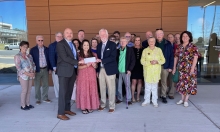General News
Sirisha Reddy, MD, had already put in a long day’s work as a cardiologist at Fayetteville Heart Center. But as evening turned to night, Reddy nevertheless took the time to pull up a chair next to Brenda Melvin’s bedside at Cape Fear Valley Medical Center and patiently answer questions.
“I thought to myself, ‘I know she has to be tired,’” said Melvin, a resident of Elizabethtown who had come to Reddy in need of treatment for atrial fibrillation. Her atrial fibrillation, which is an irregular and often rapid heart rhythm, followed a transient ischemic attack, commonly referred to as TIA. “She sat right down like she didn’t have anything else to do but talk to me. She listened.”
Though she was facing a daunting medical procedure – cardiac ablation – Melvin said the care she received at the center helped put her mind at ease. Dr. Reddy, who specializes in electrophysiology, performed the procedure in June.
“I think it’s very important to take the time to explain the procedure,” Dr. Reddy said. “It’s also helpful, with the patient’s consent, to involve someone other than the patient in the discussion.”
In Melvin’s case, she has strong support from family and friends. In fact, it was during a trip to Whiteville that Melvin’s daughter Sabrina, who is a nurse, and sister Cynthia Locklear realized something was amiss. Melvin, who had experienced her first TIA a year earlier, was again showing signs of confusion. TIA is a temporary blockage of blood flow to the brain, and while it doesn’t cause permanent damage, it is often a warning sign of a stroke.
“I had a knee replacement in March, and Brenda was driving me to physical therapy,” Locklear said. “We made it back home, but our cousin immediately took her to the hospital.”
From Bladen County, Melvin was transferred to Cape Fear Valley Heart & Vascular Center and to Dr. Reddy’s care. After the cardiac ablation procedure, which involves using heat or cold energy to block irregular electrical signals and restore a typical heartbeat, Melvin was able to return to her normal active lifestyle. Dr. Reddy is pleased that Cape Fear Valley is able to offer such specialized cardiac care.
“Our hospital administration has been very supportive,” she said. “The community needs to know they can get this kind of care and that they need not drive 100 miles from home to get it.”
Though about 30 percent of people with atrial fibrillation don’t experience symptoms, Dr. Reddy said early diagnosis is critical. In fact, Dr. Reddy said, the problem is sometimes discovered while a patient is being prepared for an important diagnostic or preventive procedure, such as a colonoscopy.
“That’s one reason you have to have your regular medical checkups by your primary care physician,” she said. “With early treatment, the success rate of ablation is close to 80 percent. Word needs to get out about the importance of early referral.”
Ablation, however, is not always required to treat electrical problems in the heart. “The first step is usually medication,” Dr. Reddy said. “It’s not about one treatment. It’s a process.”
Certain factors increase the risk of atrial fibrillation, which can lead to stroke. The older a person is, for instance, the greater the risk of developing atrial fibrillation. People with heart disease — such as heart valve problems, congenital heart disease, congestive heart failure, coronary artery disease or a history of heart attack or heart surgery — also have an increased risk. Other risk factors include high blood pressure, thyroid disease, drinking alcohol, obesity and family history.
Melvin, a graduate of Fayetteville State University and a retired mental health social worker, considers herself blessed that she was able to receive excellent care and treatment and that she can again enjoy spending time with family and friends, including her supportive fellow members of Baldwin Branch Missionary Baptist Church.
She and her sister, who lives right next door, were able to enjoy a big Thanksgiving together as well and Melvin also decorated her home for Christmas.
“I feel pretty good,” Melvin said. “I used to stay active all the time, and I was always on the go, and now I can still go.”
She recently went on a trip to Myrtle Beach, S.C., with several of her classmates from Bladen Central High School.
“We’ve always been a close class,” she said. “We all have one ailment or another, but we’re hanging in there.”




